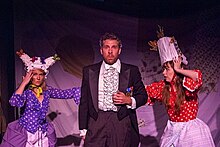Così
| Così | |
|---|---|

Così at Urban Stages in New York City, 2012
|
|
| Written by | Louis Nowra |
| Date premiered | 1992 |
| Place premiered | Belvoir St Theatre, Sydney, Australia |
| Original language | English |
| Genre | Drama |
| Setting | Mental institution in Melbourne, 1971 |
Così is a play by Australian playwright Louis Nowra which was first performed in 1992 at the Belvoir St Theatre in Sydney, Australia. Set in a Melbourne mental hospital in 1971, Così is semi-autobiographical, and is the sequel to his previous semi-autobiographical play, Summer of the Aliens.
The play was adapted into the 1996 film Cosi.
Set several years after the events of Summer of the Aliens, Lewis is now in a strained relationship with a bossy woman named Lucy, and in a friendship with political extremist, Nick. Lewis is always desperate for work as he states "I need the money". The venue is a theatre that smells of "burnt wood and mould", the cast are patients with very diverse needs, and the play is Mozart's Così fan tutte. Through working with the patients, Lewis eventually discovers a new side of himself which allows him to become emotionally involved and to value love, while anti-Vietnam war protests erupt in the streets outside.
The patients make up a wide spectrum including Roy, a manic-depressive with a passion for theatre; Cherry, who has a food obsession and is a Lewis-addicted romantic; Ruth, suffering from obsessive–compulsive disorder (OCD) and is shown as obsessed with counting and distinguishing between illusions and reality; Doug, a pyromaniac, who loves sexual innuendo; Julie, dependent on drugs in the outside world; Henry, an older, silent man, previously a lawyer; and Zac, a drugged-up pianist.
Other characters include Justin, a social worker at the mental institution; Lewis's girlfriend Lucy and his best mate Nick, whose strongly left-wing ideals Lewis has followed up until now without question. Meeting patients with views different from Lucy's and Nick's opens Lewis' eyes to other people and the world around him, teaching him to be more tolerant.
...
Wikipedia
